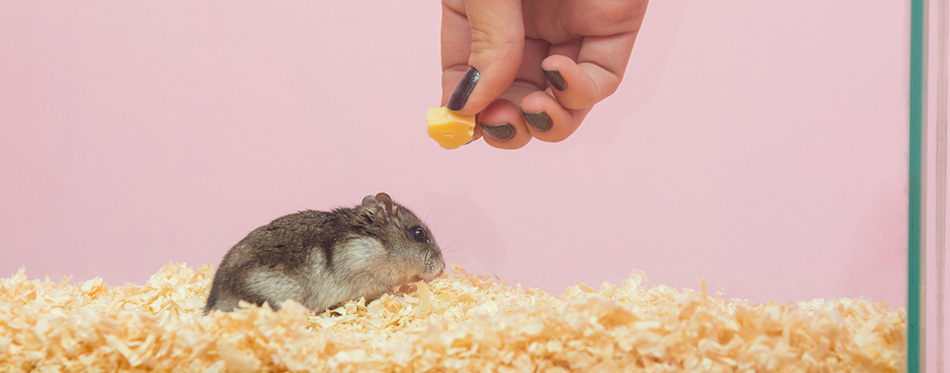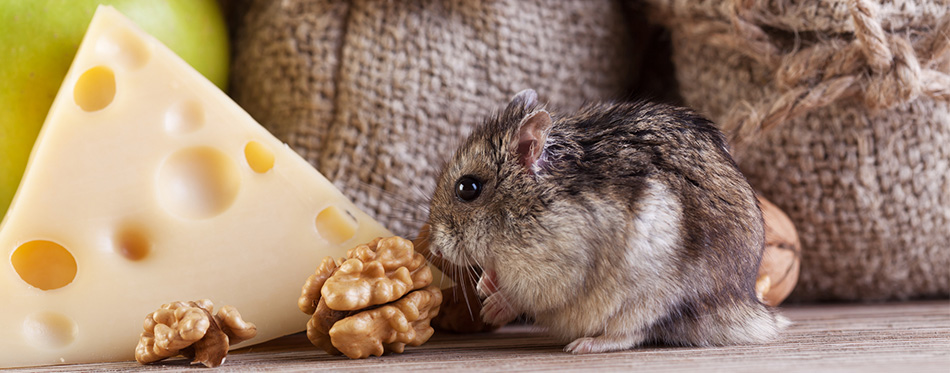From time to time, you probably get sick of giving your pet hamster the same old thing and want to vary up their diet a little bit. But before you give them anything unusual, you need to make sure that it is actually safe to feed them. Cheese is obviously highly popular amongst human beings, but the question remains: can hamsters eat cheese?
The short answer is yes, hamsters can eat cheese but only in small amounts. Many furry little critters love the taste, but you don’t want to risk overfeeding them with it as this can end up leading to various health complications. Hamsters have an entirely different digestive system to us, and they are naturally lactose intolerant, so they can’t digest dairy in the same way that we can. So, if you do decide to feed your hamster cheese, it should be done on a strict treat basis.
With this in mind, let’s go into more detail about the world of hamsters and cheese!

Health Benefits and Risks
First and foremost, we should start by looking at some of the health benefits that your hamster can receive from eating cheese, as well as a few of the risks. You need to get a full picture before you decide one way or the other whether you are going to give them some cheese.
Hamsters in the wild generally subsist on a diet made up of plant matter – with the occasional insect or small reptile thrown in. Domesticated hamsters tend to eat a pellet-based diet, with some ‘human food’ thrown in – but you can’t give them everything so always check first before risking upsetting the delicate system of your furry little friend.
Since hamsters are not used to processing dairy, they are what is commonly described as lactose intolerant. This means that their body cannot properly process one of the most common substances found in cheese. This intolerance is commonly found in a lot of different types of animals after they have been weaned off their mother’s milk. While a small amount of cheese is usually okay, too much can lead to all sorts of stomach upset.
Beyond the fact that they can’t digest it properly, cheese also contains a high fat content, so you don’t want to risk feeding your hamster too much as it can cause them to start piling on the pounds!
Cheese is a snack that provides some nutritional benefits. It features a wide range of beneficial substances including calcium, protein, zinc, riboflavin, phosphorous, vitamin A, and vitamin B12. But you need to remember that because your hamster can’t digest it properly, they are not going to experience the full range of benefits from eating it. But cheese is something that hamsters tend to love, and while the nutritional benefits aren’t the same as we get, you can still feed your hamster cheese from time to time.
How to Feed Your Hamster Cheese
Before you give your hamster cheese, you need to learn how to do so properly. We already know that your hamster is likely to love the taste, but you will need to make a special effort to control them and prevent them from consuming too much of it. When you are feeding your hamster cheese, you should think little and infrequently as a good rule of thumb. 2-3 times a week is plenty. Choose relatively mild cheese such as cheddar rather than anything too strong. Also, be wary of cheese that contains any additives as this should be avoided entirely.
Before you start adding cheese to your hamster’s diet, you should make sure that all their other needs are being comfortably met. While chest contains several nutrients, we have already discussed how a hamster cannot properly digest it and will not experience the full range of benefits. Hamster diets should largely consist of high-quality pellets or mixed food that has been specifically formulated for them. There are also plenty of other hamster treats out there which you can give to your little pet on a more regular basis.
What Do Hamsters Usually Eat?
To help you see how cheese fits into a hamster diet, we can also explore the type of food that they would naturally eat in the wild. Strangely enough, cheese doesn’t usually factor into it at all! Hamsters have only been domesticated for a relatively short space of time and have been roaming free throughout the world for much, much longer. As you would expect from creatures that survive and thrive in the wild, their digestive system has become finely tuned. If at all possible, you should be looking to match your hamster’s diet to those ones in the wild as closely as you can.
While hamsters are officially classified as omnivores, their diets are, in fact, closer to what you would call a herbivore. The majority of their food should consistent of plant matter of some description. A good blend of nuts, grains, fruits, and vegetables will keep your hamster happy and healthy. However, hamsters would also traditionally be scavengers, eating what they could get their little paws on. So, the exact dietary trend of a particular species of hamster would depend on exactly where in the world it is found. Meat such as frogs and lizard would have been typically eaten by hamsters. Head over to our review of hamster food for more options.

Final Thoughts
As a hamster owner, your pet’s health is obviously your number one priority. And we are happy to report the good news that small amounts of cheese should not be harmful to their health. But you certainly shouldn’t overdo it. The digestive system of a hamster is entirely different from ours, and since they are lactose intolerant, you will be doing more harm than good if you overfeed your furry friend with too much cheese. However, if you give them the occasional piece from a couple of times a week, there should be no real issues. And your hamster will certainly thank you for it too!

